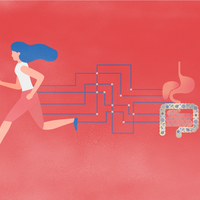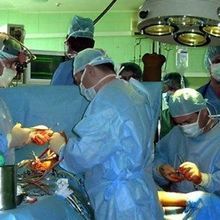obesity

Early Epigenetic Changes Regulate Voluntary Exercise in Mice: Study
Emma Yasinski | Dec 7, 2019 | 3 min read
Altering DNA methylation in a particular area of the hypothalamus halved the animals’ voluntary exercise as adults.

Exercise Changes Our Gut Microbes, But How Isn’t Yet Clear
Ashley Yeager | Aug 15, 2019 | 5 min read
Physical activity, independent of diet, shifts the composition of bacteria in the intestines, spurring researchers to search for species that might provide benefits akin to working out.

Laura Bowers Works to Sever the Link Between Obesity and Cancer
Shawna Williams | Jul 15, 2019 | 3 min read
The Purdue University nutrition researcher delves into the details of how fat tissue affects tumors.

Microbe Miner: A Profile of Rob Knight
Anna Azvolinsky | Jun 1, 2019 | 9 min read
Developing computational tools to analyze the reams of microbial sequencing data his lab generates, the UC San Diego microbiologist is a pioneer of microbiome research.

Genetic Risk Score Developed for Obesity
Kerry Grens | Apr 18, 2019 | 2 min read
The tool weighs millions of variants to determine how susceptible a person is to becoming obese.

Fat Tissue Can Help Cancer Cells Proliferate, Metastasize
Catherine Offord | Apr 1, 2019 | 3 min read
Researchers disentangle how adipocytes communicate with prostate tumors in mice.

Changes in Height Linked to Increased C-section Rates
Abby Olena, PhD | Feb 6, 2019 | 4 min read
Countries with populations whose average adult height grew late last century are more likely to have high rates of babies delivered surgically.

Genetic Predisposition to Obesity Linked with Depression
Ashley P. Taylor | Nov 13, 2018 | 2 min read
The variants associated with the mood disorder included those without metabolic risks, suggesting it is the psychological effects of obesity at play.

Self-Control Center in the Brain Linked to Weight Loss
Ashley P. Taylor | Oct 18, 2018 | 2 min read
Activity in the lateral prefrontal cortex was the best correlate of weight loss in a study of people on a restricted-calorie diet.

Maternal Obesity and Diabetes Linked to Autism in Children
Sukanya Charuchandra | Oct 1, 2018 | 5 min read
Inflammation may be a strong contender for the connection between mom’s weight and children’s neurodevelopment, according to lab studies on animals.

Microglia Cause Cognitive Decline in Obese Mice
Diana Kwon | Sep 10, 2018 | 3 min read
The brain’s immune cells gobble up synapses in the hippocampi of rodents fed high-fat or high-sugar diets.

Limited Meal Times Prevent Obesity in Mice Prone to Gaining Weight
Abby Olena, PhD | Aug 30, 2018 | 3 min read
Even in mice with a busted circadian clock and an unhealthy diet, carefully timed feeding overcomes the rodents’ predispositions for metabolic diseases.

Researchers Identify Biomarkers for Obesity Risk in Women
Catherine Offord | May 31, 2018 | 2 min read
Low levels of a biochemical process involved in fat breakdown predicts weight gain and metabolic complications more than a decade later.

Primary Cilia in Neurons Linked to Obesity
Abby Olena, PhD | Jan 8, 2018 | 3 min read
Three studies—one of mice and two of human genetics—describe the role of two proteins, adenylyl cyclase and melanocortin 4 receptor, in the development of obesity and diabetes.

Hormone Loss Prevents Obesity and Diabetes in Mice
Abby Olena, PhD | Nov 6, 2017 | 4 min read
Asprosin—involved in a rare disease called neonatal progeroid syndrome—targets neurons to stimulate appetite, and blocking the hormone wards off weight gain in rodents.

Why Afternoon Open Heart Surgery Is Better for Patient Outcomes
Catherine Offord | Oct 27, 2017 | 2 min read
Research in human patients and mice reveals the role of the circadian clock in the risk of heart damage at different times of day.

A Molecule to Treat Obesity?
Ashley P. Taylor | Oct 18, 2017 | 2 min read
GDF-15 lowers body weight in mice and primates.

Skin Graft-based Gene Therapy Treats Diabetes in Mice
Shawna Williams | Aug 4, 2017 | 2 min read
A small patch of engineered cells makes an enzyme that stimulates insulin release.

Study: Microglia Tied to Weight Gain in Mice
Aggie Mika | Jul 5, 2017 | 2 min read
Just by activating these immune cells in the brain, scientists could make mice eat more and burn fewer calories.

Running on Empty
Bob Grant | Jun 1, 2017 | 10+ min read
Regularly taking breaks from eating—for hours or days—can trigger changes both expected, such as in metabolic dynamics and inflammation, and surprising, as in immune system function and cancer progression.
